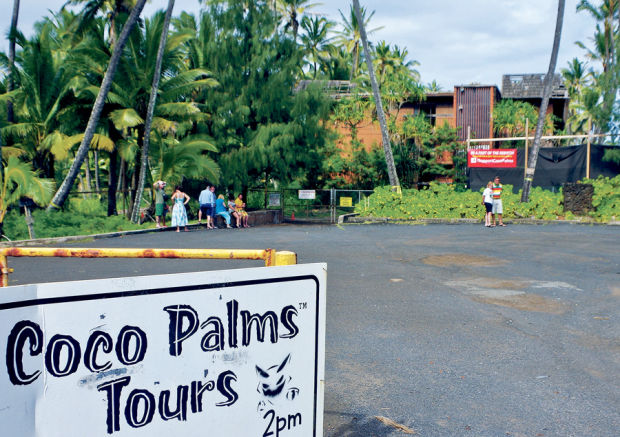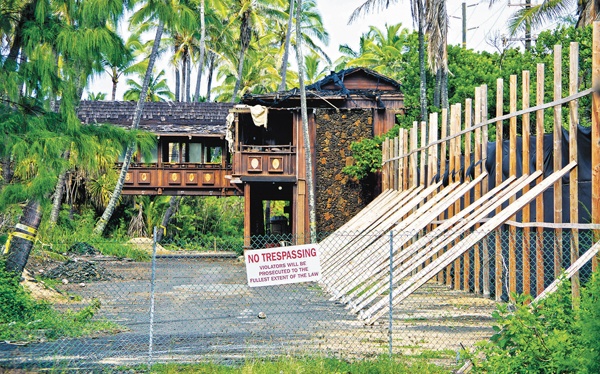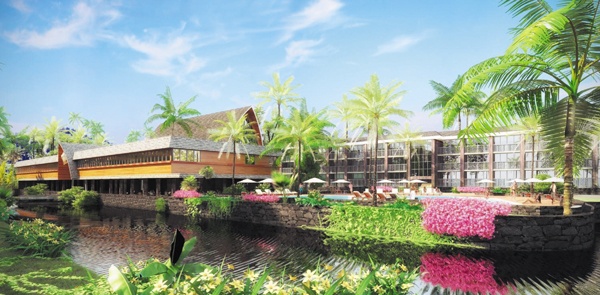LIHUE — Even before Tyler Greene and Chad Waters decided to purchase the long-vacant Coco Palms Hotel in Wailua, the investment partners said they heard stories from many residents and visitors about their personal connection to the hotel. It was
LIHUE — Even before Tyler Greene and Chad Waters decided to purchase the long-vacant Coco Palms Hotel in Wailua, the investment partners said they heard stories from many residents and visitors about their personal connection to the hotel.
It was a factor that, Greene said, ultimately motivated them to create Coco Palms Hui, LLC and take on a project that many other developers had attempted to do in previous years, but eventually failed.
“One of the repeated messages that we keep hearing is that Coco Palms represented aloha,” Greene said on Wednesday during a Kauai County Council Planning Committee meeting. “As we embark on this endeavor, we want to approach (the council) and the community and make it a very inclusive situation where we can all work together and hopefully bring back a minuscule scale of what Grace (Guslander) and the old employees there embodied.”
One of the biggest challenges now, he said, is the council’s proposal to repeal the last remaining building ordinance instituted after Hurricane Iniki. The ordinance allows for “a legally nonconforming structure to be reconstructed to its condition prior to Hurricane Iniki,” according to county documents.
If that ordinance is taken off the books, the developers say they would have a much more difficult time rebuilding the iconic resort.
On Wednesday, a subcommittee of the County Council voted to defer action on the issue, meaning the timeline behind getting a proposed project off the ground is still in limbo.
“Everyone is working together and the Iniki ordinance, if revoked, would just make it that much more difficult for us,” Chad Waters said.
His attorney, Michael Belles, said the existing Iniki ordinance exempts Coco Palms Hui plans from certain ordinances and allows the investment group to rebuild what was a non-conforming, grandfathered hotel.
Besides Coco Palms, County Planning Director Michael Dahilig said several other structures would be affected by the repeal of the last Iniki ordinance, including redevelopment efforts planned for the now vacant Hanapepe Theater.
The developers shared their project plans with the subcommittee, as well as some of the work that’s already gone into it.
To date, Waters said Coco Palms Hui has spent about $500,000 on preparing entitlement plans for Coco Palms since the investment group acquired the property in August.
Waters said the investment group is also working to assemble a group of landscapers, prepare a hazardous material study and select either Starwood Hotels and Resorts or Hyatt Hotels and Resorts as the hotel’s operator.
“It’s important for us that, as we choose an operator, it is a soft brand,” Greene said. “Coco Palms name and legacy, especially the cultural importance there, is something that we really want to try and embody as we go about this, so it’s important any operator that we choose truly understands and supports that.”
But those aren’t the only changes planned for the hotel.
According to preliminary redevelopment plans, Waters said the number of units may decrease from 393, in the former hotel prior to Hurricane Iniki, to about 300 to 325.
Jennifer Luck, Kauai island director for the Hawaiian Island Land Trust, said the organization received $270,000 from the state Legislature in March to perform a feasibility study and conduct a community input process to determine the best use of the Coco Palms site.
These funds, now pending release from the state in January 2014, would be used to hire a consulting firm charged with finding experts to appraise the property, compile a hazardous materials report and assess the structural integrity of the existing buildings.
It is a process that, Luck said, could take up to a year to 18 months to complete.
Additional funding beyond that amount would primarily rely on other sources, such as private donors who have expressed a particular interest in the redevelopment of Coco Palms.
“There has been … numerous attempts to develop this property over the years, so a lot of this work has already been done,” Luck said. “We are privy to some of that work already, so we’re hoping that investors or people involved with the project in the past will be able to send that information along the process to meet our timeline and save some costs.”
Dirk Soma, a member of the newly-formed Coco Palms Cultural Advisory Committee, said he and the other committee members strongly support an extension of the ordinance, which would allow Coco Palms Hui developers to secure the proper permits and kickstart construction.
“This action will enable the developer to enhance Hawaii’s hospitality industry by increasing Kauai’s accommodations inventory, bring some much needed funding to our island and enable us to honor the legacy of the lands on which Coco Palms is built,” Soma said.
Planning Committee members unanimously decided to defer the bill to the council’s next committee meeting on Dec. 11 but not before many spoke about a collective desire for the Coco Palm’s rebirth.
“This is a tough one,” Councilman Tim Bynum said. “It’s so compelling emotionally to want to bring back the Coco Palms. But if we say yes to this, these folks can proceed down a path where our options will be limited. Maybe that’s what we’ll decide, but I’m not personally ready to decide that today.”
Two other ordinances instituted after Iniki, including an expedited building permit process and a fee exception for hurricane damage repairs, were repealed by the council in 1997.
• Darin Moriki, staff writer and photographer, can be reached at 245-0428 or dmoriki@thegardenisland.com. Follow him on Twitter at @darinmoriki.




